Welcome to GLA! Leading the global logistics alliance.


Your location:Home > News > The 2nd Global Supply Chain CEO Forum Held at the 13th GLA Conference
Time:2025-11-24 Publisher:Kevin Num:345
On the evening of November 9, 2025, the 2nd Global Supply Chain CEO Forum convened in Bangkok as a key event of the 13th GLA Global Logistics (Thailand) Conference. The forum, themed “Empowering Logistics for Tomorrow: Innovation, Resilience, and Technology,” with a core focus on “AI Adoption and Digital Transformation in the Logistics Industry,” brought together leading CEOs and industry experts from around the globe. Discussions centered on advanced strategies for AI adoption, supply chain redesign, and accelerating digital transformation through cutting-edge technologies.

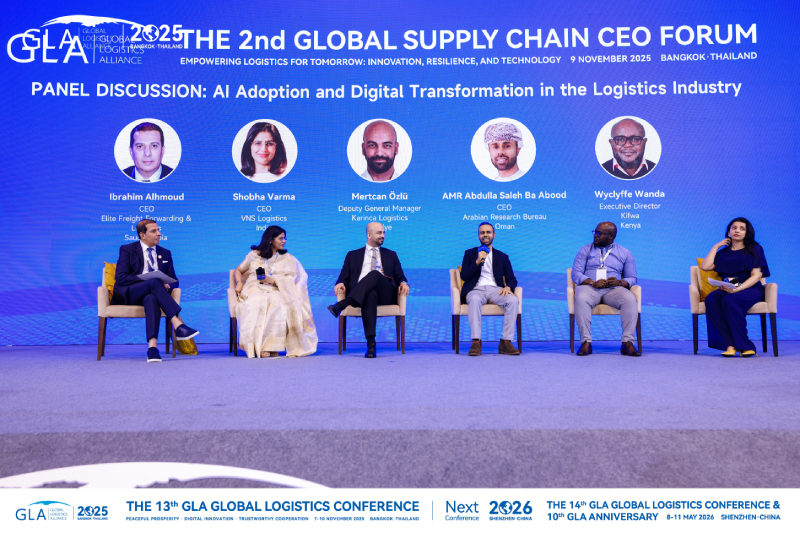
Ms. Grace Sun, Founder and President of the GLA Global Logistics Alliance, delivered the opening address. Drawing on her extensive industry experience, she emphasized that today’s logistics leaders must have an “eagle-like vision” to navigate change and maintain a competitive edge. She underscored the forum’s purpose: to explore ways to “Empower the future of logistics through innovation, resilience, and technology,” with particular attention to AI adoption and digital transformation.
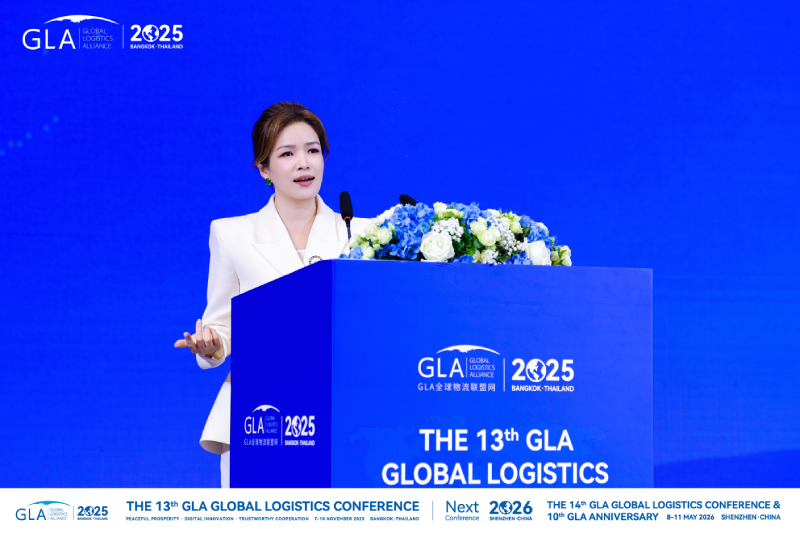

The GLA President highlighted two critical industry priorities. First, she noted that past “efficiency-first” approaches have proven vulnerable and stressed the importance of diversified, decentralized networks and open collaboration to address uncertainties creatively. She stated, "We firmly believe that only with a sufficiently broad partner ecosystem can we calmly switch routes, mobilize global resources, and spark innovative solutions when crises strike."
Second, "Intelligently Connect the Future, Empower with Technology." Grace asserted that AI and digitalization are no longer optional but are the new infrastructure of logistics, driving efficiency and value reshaping. She called for a shift in mindset to fully integrate these technologies into decision-making and operations, envisioning GLA's role in leveraging intelligent matching and community linking to empower every logistics segment.
She concluded by inviting all attendees to "think together, grow together, and work hand-in-hand to lead the industry towards a more resilient, intelligent, and prosperous future!"
The forum also featured keynote presentations from CEOs of major international logistics firms. They shared compelling case studies on topics such as the impact of AI on logistics operations, successful digital transformation initiatives, innovative supply chain reconfiguration strategies, and more.
At the forum, Mr. Vinet K Chadha from Combined Logistics Solutions Pvt. Ltd., India, delivered a powerful message on how AI, digitization, and leadership mindset are redefining the future of global logistics. He emphasized that technology is no longer a competitive advantage—it has become a baseline requirement for survival in an increasingly fast-moving supply chain environment. Mr. Chadha highlighted, “AI has silently become the backbone of modern logistics operations, driving accuracy, reducing delays, and ensuring smoother cross-border movements.” He stressed that true transformation requires a shift in internal culture, not just investment in software, stating: “You cannot just buy AI—you must build readiness for AI.”
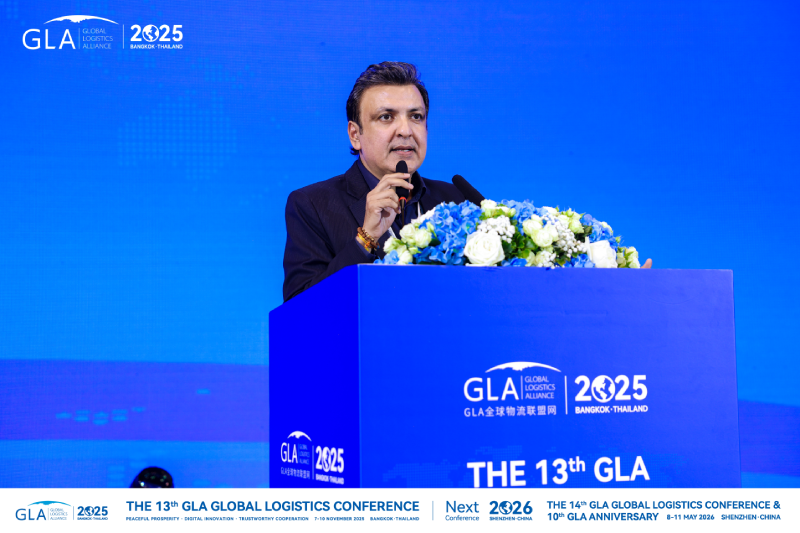
Mr. Adeel Baig of CTI Shipping LLC, Pakistan, highlighted how AI, IoT, and digital platforms are rapidly transforming the logistics industry. He emphasized that smart technologies are driving major gains in efficiency, visibility, and cost reduction, while also strengthening resilience in a fast-changing global market. Mr. Baig addressed key challenges—such as talent shortages and system integration gaps—and stressed the need for strong leadership, digital readiness, and sustainability-focused strategies to help logistics companies stay competitive and future-ready.
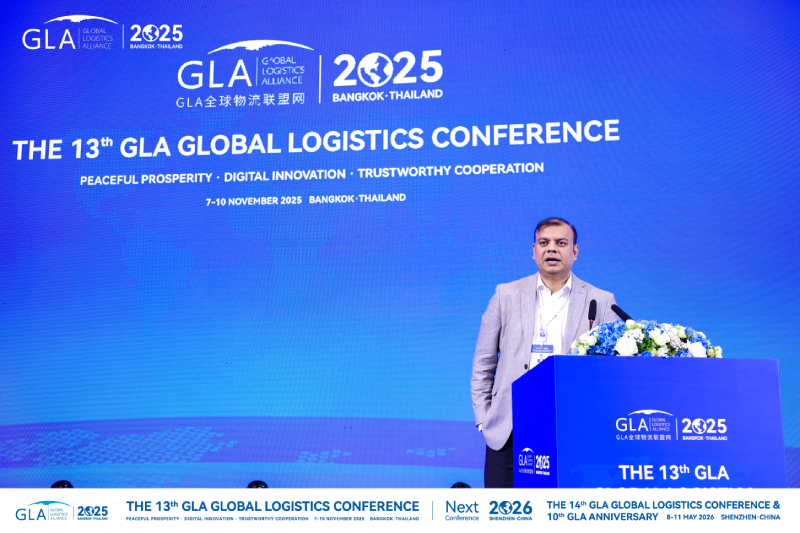
Mr. Aivars Taurins from SBS Logistics CIS FE, delivered a forward-looking perspective on how digital logistics is laying the foundation for the next generation of automation. He underscored the growing importance of integrated systems—TMS, WMS, ERP, AI, and IoT—along with robotics, smart wearables, and system-managed manpower. Mr. Taurins emphasized that strong digital foundations, standardized processes, and modern cyber-physical infrastructure are essential for companies aiming to compete in an increasingly automated ad connected global logistics landscape.

Another speaker, Mr. Hugh O'Connell from WallTech, China, delivered a data-driven and future-focused presentation on AI adoption and digital transformation in the logistics industry. He emphasized that the global supply chain is entering a stage where AI is no longer optional—it is becoming unavoidable, noting that AI is projected to generate $19.9 trillion in value for the logistics sector between 2025 and 2030, even though only 10% of companies have fully adopted it so far. Mr. O’Connell concluded by stressing that logistics companies must accelerate their AI adoption not only to stay competitive but also to remain relevant in the rapidly evolving global supply chain landscape.

A major highlight of the forum was the panel discussion, themed “AI Adoption and Digital Transformation in the Logistics Industry,” which brought together CEOs and thought leaders from logistics and supply chain enterprises worldwide.
During the discussion, the panelists addressed key challenges and emerging trends in AI adoption, capacity building, and workforce training for AI infrastructure. They shared valuable insights on how SMEs can leverage AI without large financial investments, highlighting practical AI solutions and the benefits of adoption in their respective regions. The panelists also revealed their companies’ latest advancements in core resource deployment, showcasing innovative strategies that are driving international collaboration and injecting new momentum into the global logistics industry.
The forum concluded with a dynamic open-sharing session, bringing together participants from around the world to exchange insights, showcase their services and experiences, highlight best practices, and explore new avenues for collaboration, fostering a spirit of global learning and connectivity.
The 2nd Global Supply Chain CEO Forum served as a premier platform for the convergence of ideas among global logistics leaders, successfully shaping industry consensus. The forum provided a multi-dimensional framework for the future of logistics, offering actionable insights and real-world case studies that showcased innovative strategies and best practices.
In the aftermath of the forum, participants emphasized their commitment to leveraging the GLA platform as a vital conduit for deepening collaboration, unlocking new opportunities, and advancing high-quality, sustainable growth across the logistics industry.
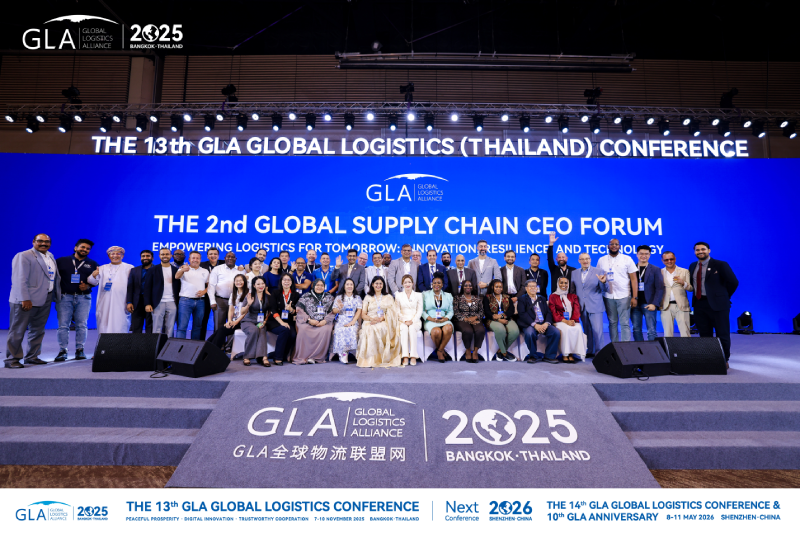
The 13th GLA Global Logistics Conference featured an opening ceremony, the GLA Panel Discussions, the Global Supply Chain CEO Forum, one-on-one business meetings, professional exhibition displays, and various cultural exchange activities. It offers a comprehensive, high-level international logistics cooperation platform, offering extensive opportunities for in-depth interaction and practical collaboration to participants from around the world.
Currently, GLA has brought together over 7,000 specialized international logistics companies, covering more than 170 countries and regions and 706 ports worldwide. With its core values of openness, collaboration, and innovation, GLA is committed to driving global cooperation among small and medium-sized logistics enterprises and facilitating global business with world-class resources. Through this Thailand conference, GLA further solidified its influence as a global logistics hub and industry innovation platform, bringing together global expertise to shape a more prosperous future for the logistics industry.
Prev:Welcome! New GLA Golden Member from UAE ———— LEADERS LOGISTICS L.L.CNext:The 13th GLA Conference Sports Events: Networking Through Action & Collaboration
Latest News